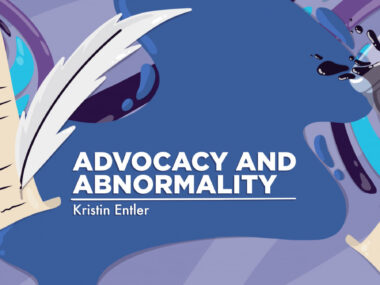‘It’s not contagious’: How to address stigmas about the CF cough
Written by |
This piece is part of a series about living with invisible illness for Cystic Fibrosis Awareness Month. Read more here.
While cystic fibrosis (CF) is an invisible illness, it can be heard. That trademark gurgling, wet, productive CF cough sets many on edge because the cause remains invisible.
My cough has produced numerous awkward situations. A person yelled at me on an airplane because he couldn’t sleep thanks to my cough, and a concerned nurse asked if I was walking around with the highly contagious whooping cough. The moment COVID-19 hit news headlines, that cough became even more of a social liability.
Following is a guide on how to handle these situations with minimal embarrassment.
Flash your clues
Antibiotic side effects struck me deaf in 2016. This led to many assuming I was rudely ignoring them in public when in reality I simply couldn’t hear them. So I bought a pin that says, “Deaf but friendly.”
Similarly, I own a lot of CF apparel, not because the disease is hip, but because I hope people catch the hint that I have a chronic disease and assume my cough springs from it. Flash that CF awareness bracelet when coughing, and maybe onlookers will connect the dots.
Replace assumptions
I used to take fake hits of an empty inhaler when coughing in crowded areas to set people at ease because it turns out many are less concerned with a person having an asthmatic episode than someone spreading a contagion.
I even used to take sips of water from a water bottle a bit before coughing so I could say the classic “Oops, wrong tube!” after coughing.
Offer alternative visual narratives that might preempt negative assumptions to give you control over how your cough is perceived. Maybe this seems unethical, but others already have the wrong idea of what’s going on, so I merely replace that with a more socially acceptable wrong idea.
In the end, what’s really not fair is alienating someone with CF for having a cough or forcing them to disclose the disease to everyone.
Give short, direct explanations
You might prefer to give the actual explanation, but when you’re mid-coughing fit, you don’t always have the energy to elaborate. If you can spit out a sentence or two, though, memorize one of these CF explanations.
I often pant out only the words “genetic lung disease” because the stigma attached to “sick” is that it’s contagious, whereas “genetic lung disease” sounds more chronic and contained to the individual.
Some people even keep business cards to hand out in awkward situations that describe CF.
Train your allies to speak for you
I don’t always want loved ones to step in and explain my disease to others, but help is welcome if I’m in the middle of a coughing fit and others are freaking out, thinking that I’m suffocating or infecting everyone.
Train loved ones on when and how to speak up for you using this guide.
Comfort the other
You know your cough isn’t contagious, but that doesn’t mean you shouldn’t practice the vampire cough for basic hygiene and to set others at ease.
You might also appeal to the humanity of the other by saying, “Sorry if I startled you! Don’t worry, I just have a genetic lung disease.” You don’t owe them an apology for something out of your control, but if simple words can defuse an awkward situation, then go right ahead.
Keep others in check
A person told me to “stop coughing” in a library, and my friend replied: “That wasn’t kind. His cough can’t be helped.” The effect was immediate; the person blushed and muttered an apology.
Most people, though not all, want to be kind. They may think that pointing out your cough is them being kind — that they’re reducing contagion spread to protect medically vulnerable people like you — but sometimes you need to remind them that it isn’t kind of them to assume the nature of your cough.
Many have the courage to try correcting behaviors only because they believe all others are in agreement. If you or a loved one respond by letting them know they aren’t actually being all that thoughtful or kind, you may draw them to a realization that they’re misled in their assumptions.
This won’t always work, but I have a few examples of pointing out that others are not actually achieving their aim of being kind, saving me by either striking their conscience or encouraging others in the area to back me up.
Focus on what’s real
At times, dazed by the stares of strangers after a long coughing fit, I just don’t have the energy to guide them away from their assumptions. In these moments, it’s useful to frame reality: “I won’t see most of these people ever again. Once we step off this bus, they’ll forget me within seconds.”
Some of the best advice I’ve ever gotten is that most people won’t remember your most embarrassing moments, save for that one best friend with whom you can laugh about anything.
Note: Cystic Fibrosis News Today is strictly a news and information website about the disease. It does not provide medical advice, diagnosis, or treatment. This content is not intended to be a substitute for professional medical advice, diagnosis, or treatment. Always seek the advice of your physician or other qualified health provider with any questions you may have regarding a medical condition. Never disregard professional medical advice or delay in seeking it because of something you have read on this website. The opinions expressed in this column are not those of Cystic Fibrosis News Today or its parent company, Bionews, and are intended to spark discussion about issues pertaining to cystic fibrosis.





